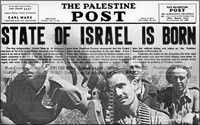 The death of Joshua brought about an entirely new situation in Jewish history and Jewish life. For the first time the Jewish people were independent in their own homeland – and, even more significantly, for the first time they did not have a single, strong leader.
The death of Joshua brought about an entirely new situation in Jewish history and Jewish life. For the first time the Jewish people were independent in their own homeland – and, even more significantly, for the first time they did not have a single, strong leader.
Moses and Joshua were each the General, Prime Minister and Chief Rabbi all rolled into one. And the Jewish people responded to them. However, such leaders come about perhaps not even once in a thousand years. The vacuum of leadership created by the death Joshua led to all sorts of challenges.
Right in his own Eyes
Before Joshua died he conquered as much as ninety percent of the Land, divided it among the tribes and disbanded the great army he had assembled. Each person went back to his own tribe. The center point of Jewish life began to dissipate. Instead of one Jewish people there were twelve tribes who had a loose allegiance to each other.
Besides lacking central temporal authority (i.e. central government) there was little religious authority in many ways as well. Although they had the Tabernacle (which centuries later would be replaced by the Temple in Jerusalem), there was competition from private altars (bamos in Hebrew). These were not altars for idol worship, but a place in the backyard to offer private sacrifices. The alternative of private sacrifices undermined the idea of the Tabernacle as the central location for religious life.
On top of everything, the era of the Judges was a period of almost continual warfare – a state of affairs that would continue until the time of Samuel, the last of the Judges.
Meet the Judges
There were 15 Judges – or leaders — during the period of the Judges, which lasted more than three centuries. We will not cover them all in detail, but have provided a table at the end which briefly outlines who they were.
After Joshua’s death, there was a slow re-infiltration of the enemies whom he had driven from the land. For more than a century, father, son, grandson, great-grandson, great-great grandson – all had to fight what often seemed like the same never-ending war. It had a demoralizing effect.
Eventually, by the time of the third Judge, Shamgar ben Anas, the enemies to the east and west had been defeated. Nevertheless, there was still a threat from the north by a king named Yavin, whose fortified city-state lay in the Galilee.
Yavin developed metal-manufacturing foundries used for weaponry. Employing this new technology, he innovated a method of mechanized warfare using chariots that no one could match. On top of his technological advantage, he aligned himself with the greatest General of the time, Sisera, who had never lost a battle.
No one could stand against Sisera, including the Jewish people. Indeed, he went out of his way to terrorize them. After all the wars, this brought Jewish morale to a new low.
The situation was turned around by a great person – who happened to be a woman: Deborah.
Deborah
She was a born leader; a prophetess possessing great knowledge, intelligence and charisma. She was also famous for conducting her meetings with great modesty in the open under a palm tree. We do not know much about her husband, whose name was Lapidus. It is not unusual for the husbands of powerful and famous women to remain relatively anonymous.
Deborah mobilized an army led by Barak, who like her was from the tribe of Naftali. However, even she could not mobilize too many from the other tribes. They were frightened of Sisera and as the battle took form the other tribes mostly stood by and watched, which was indicative of the times of the Judges.
The battle took place in the Galilee on Mount Tabor, which is a particularly beautiful and majestic mountain as well as a strategic position to see everything that moves in the Galilee. Sisera realized he had to capture the mountain to subdue the Jewish people. Deborah and Barak also knew that and prepared their strategy accordingly.
They destroyed Sisera’s army, powerful new metal chariots and all. Sisera himself fled on foot. Barak sent crack soldiers in hot pursuit, fearing as long as Sisera lived he would rally another army around him.
Sisera came to the tent of a man named Heber the Kenite (Judges 4:11), whose wife, Yael, seduced him and then drove a peg through his temple with a hammer. The biblical narrative considers her act worthy of great blessing. The Oral Tradition classifies her act as one of the rare cases in history of a “sin for pure reasons.”
After Sisera’s death, the Jewish army drove Yavin out of his fortified city, ending the threat completely. This took place in the first year of Deborah’s reign. For the next 40 years the Jewish people knew real peace.
Deborah celebrated the victory by composing a famous song, which can be found in Chapter 5 of the Book of Judges. It is a song of exultation commemorating a victory so decisive that it would bring tranquility to the Jewish people and usher in a Golden Age.
Samson
After Deborah, eight different Judges ruled Israel over approximately the next 120 years. There were great leaders as well as tyrannical leaders like Avimelech (see chart below).
The ninth Judge after Deborah, the thirteenth Judge overall, was Samson, who is arguably the most difficult one to characterize and understand. During his reign, the eastern border quieted down but the western one heated up. The Philistines came back with a vengeance and remained the main enemy of Israel for the next 100 years.
They marauded and raided the Jewish people, who had to pay tribute to them as well as conduct foreign policy according to the desire of their Philistine masters. Worst of all, worship of the Philistine gods infiltrated Jewish neighborhood and homes.
Into this Philistine-dominated world, Samson was born — miraculously. One day an angel appeared to his mother and informed her that she was going to have this son destined for greatness (Judges 13:3-5). As he grew up, “the spirit of God beat within him” (Judges 13:25). A true scholar in his own right, he headed an institution of higher learning which trained the next generation of scholars.
Samson, however, was a one-man operation. Whereas the other Judges were able to rally others in their cause, he had few allies or friends. Nevertheless, he became a true hero performing legendary feats of bravery and strength (see Judges 14:6 and 15:15). He was the master of covert operations, hitting the Philistines hard without them realizing it was he who did it.
At the same time, he had other characteristics that are hard to reconcile. His first wife was a Philistine. Even though his marriage to her was part of a plan to undermine the Philistines, it was, shall we say, an unorthodox way of dealing with the problem. Later he married Delilah, also a Philistine woman, whose treachery caused him to fall into the hands of the Philistines.
He was imprisoned and blinded by the Philistines, causing great despair among the Jews whose hope for salvation from the heavy hand of their most hated enemy had now evaporated. Nevertheless, in the end Samson took revenge upon his enemies.
On the day of a great feast the Philistines took him out of prison and tied him to two great stone pillars in their temple, planning to make a public spectacle of him. With 10,000 onlookers packing the temple, he mustered his last ounce of strength, collapsed the pillars and literally brought down the house, bringing many of Israel’s enemies to their deaths along with him.
Eli the Kohen
The last of the Judges before Samuel was Eli the Kohen, who lived to be 98 years old. Toward the end of Eli’s lifetime, the Jewish people went to war with the Philistines (I Samuel 4). Mistakenly believing that it would insure themselves of victory, they took the Ark out to war. They not only lost the war but the Ark was captured.
However, wherever the Philistines put it, it caused problems. First they put it in the temple of their god Dagon and the next morning it toppled over on its face. They put the idol back up… and the next day it fell on its face again, this time with its hands severed (I Samuel 5:3-4).
They moved the Ark to a different city and a horrible plague broke out there. They moved it to yet another city and the same plague broke out there. They moved it from one city to another and wherever it went the inhabitants suffered terrible plagues and died. The Philistines did not know what to do with it. None of the cities would take it. After seven months the Philistines sent the Ark back on wagons led by rider-less oxen.
Since the Philistines had destroyed the Tabernacle that housed the Ark the Jews now had no place to put it at first. Eventually, they found a worthy person, who kept it in his house for 20 years (I Samuel 7:2), but the Ark would not find a permanent home until the Temple of Solomon would be built decades later.
Eli died when he heard news of the capture of the Ark. However, he had raised a student-protégé who first came to him as a child. That child was Samuel, who would become the next Judge, one of history’s greatest prophets, an equal to Moses in many respects, as well as savior of Israel.
Outline of the Era of the Judges
| Judge | Ruled | Highlights |
| Osniel ben Kenaz | 40 years | Judges 3. The leading Torah scholar of his day. From the tribe of Judah. He defeated Kusham Reshasayim, a tyrant funded by the Phoenicians, who was the first enemy to attack Jews after Joshua had settled the land. |
| Ehud ben Geira | 80 years | Judges 3. From the tribe of Benjamin. Defeated Moab and Ammon. |
| Shamgar ben Anas | Less than one year | Judges 3. A Kohen (priest). First one who stopped the encroachment from the Philistines. |
| Deborah | 40 years | Judges 4. See above. |
| Gideon ben Yoash | 40 years | Gideon was a simple farmer when God called him to save the Jewish people. The main enemy was Midian, east of the Jordan. They began to infiltrate, kidnap Jews and extort money – in short, to engage in all of the time-honored practices of terrorism. Employing a new secret weapon — torches inside glass: the first Molotov Cocktails — he took a small army of 300 men and destroyed a Midian army of thousands. He also destroyed a great idol of Baal and expanded Torah study among the masses. |
| Avimelech | 3 years | One of the 70 children of Gideon (the son of a concubine). He killed all his brothers and claimed the leadership. He was a tyrant who was assassinated (Judges 9). |
| Tola ben Puah | 23 years | Very little is known about him in the written (Judges 10:1-2) or Oral Tradition. |
| Yair from Gilad | 22 years | He had 30 sons (Judges 10:3-5). Also, not much is known about him. |
| Yiftach ben Gilad | 6 years | Judges 11-12:6. Ostracized by others as illegitimate and kept company with “empty” people (Judges 11:3). Then the Ammonites threatened Israel. The Jews conscripted Yitfach to save them and he won. Although he was not much of a scholar, the Sages said: “Yiftach in his generation is like Samuel in his generation,” i.e. every generation’s leader is perfect for his generation, even though otherwise there may be no comparison. In the generation of Yiftach only he could have saved them, not Samuel. And vice versa. Yiftach also took part in a civil war between Jews that killed 42,000 (ibid. 12:1-6). |
| Ivstan | 7 years | Judges 12:8-10. From the tribe of Judah. Better known as Boaz, husband of Ruth, great-grandmother of King David. He had 30 children, all of whom died in his lifetime. The only one who survived was the one from Ruth at the end of his life. He raised the level of education among the Jewish people. |
| Elon from Zebulun | 10 years | Judges 12:11-12. From the tribe of Zebulun (which was situated near what today is Haifa). We know little about him. |
| Avdon | 8 years | Judges 12:13-15. Again, someone we know little about. |
| Samson | 22 years | Judges 13. See above. |
| Eli the Kohen | 40 years | I Samuel 1-4. See above. |
| Samuel | 10 years[1] | The Book of Samuel. Will discuss next. |
[1] It is not stated explicitly exactly how many years Samuel was the leading Judge. The verse says: “And Samuel judged Israel all the days of his life” (7:15). However, that cannot be meant literally. Samuel did not judge – i.e. was not the Leader — even the majority of his life: He lived fifty-two years. The first two years his mother nursed him. When she brought him to the Tabernacle at the age of two Eli was the Judge/Leader and he judged Israel for forty years (Samuel 4:18). While his teacher was alive, Samuel was not allowed to render legal decisions. Therefore, he was not the leader for at least forty-two of his fifty-two years. Therefore, the sages explained that it was as if Samuel was the Judge “all the years of his life” in the sense that he received reward as if he was leading the Jewish people his entire life.











